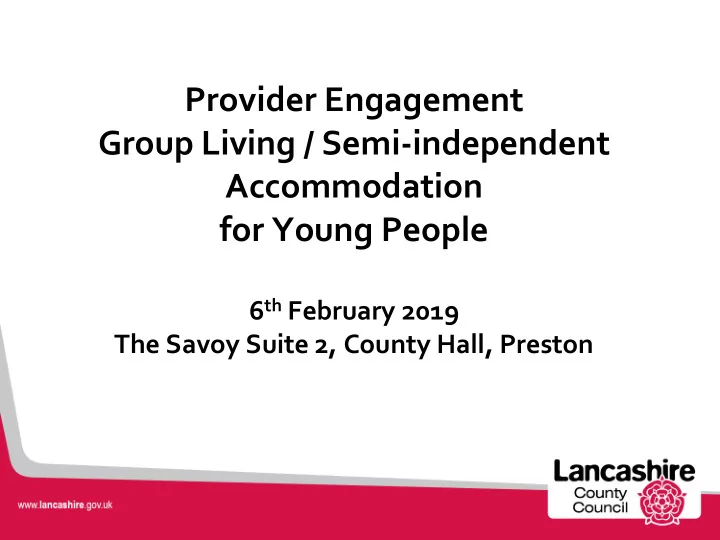

Provider Engagement Group Living / Semi-independent Accommodation for Young People 6 th February 2019 The Savoy Suite 2, County Hall, Preston
Context 1. Introduction – DPS overview 2. Existing procurement arrangements – Regional DPS 3. Rationale for Lancashire DPS 4. Current demand 5. Service Specification & defining requirements 6. Accommodation Requirements
Regional DPS Definition of Semi-Independent / Group Living: Service offering a group living communal environment with staff on site to deliver programmes of support, dependant on individual needs, to enable young people to progress towards living in their own accommodation. • Properties are in three Zones – Gtr. Manchester, Liverpool & Cheshire, North • Named properties, within 10 miles • Size of properties / support offer(s) are not defined in the service specification • No central database of accomm sizes / support arrangements • Fees are tendered at mini-competition stage
DPS Provision & Placement Data • 26 group living settings are within LCC administrative boundaries (12 districts) • Properties are in pockets of the county: Burnley (6), Accrington (3), Preston (11), Morecambe (4), Fleetwood/Lytham (2) At 31 st December 2018 43 young people were placed in group-living / • semi-independent settings: – Burnley (10) – Accrington (7) – Morecambe (4) – Preston (3) – Other, including Blackpool (19) • Due to location constraints placements in group living settings will not always be in the preferred location for the YP
DPS Provision – Group Living locations
Rationale for Lancashire DPS • Contracts for block-purchased services will end in June 2019 – opportunity for a Lancashire to establish a single procurement arrangement for all supported accommodation for YP aged 16+ • For services located within 5 miles of LCC boundaries – regional arrangements will be accessed for services required out of this area • Local monitoring of minimum standards , consistent across our services • Models of best practice nationally adopt a more flexible service delivery model where YP can more fluidly move between varying levels of support according to changing need. • Service requirements more clearly defined • Opportunity to work closer with providers to provide the best offer for YP – eg Staying Close agenda, better planning of moves into / out of services • Budget pressures – deliver best outcomes alongside value for money: - Block purchase based on ‘predictable demand’ to lower fees - Fees more directly linked to need for some service types?
Group Living Service Specification Independence skills developed in line with accredited programme (eg ASDAN) to: - respond to consultation feedback from young people - enable move on at the right time Group working with other YP in the setting / community Close links with our in-house residential Service – planned moves ‘Taster’ nights when capacity allows Peer mentoring
Lot 2 Block purchasing • In areas of the county with predictable need for this level of support • Small number of providers working closely with us to ensure outcomes for young people are achieved • Better planning of moves into and on from the services – the right placement for young people at the right time • Lower fees as void risk is with the Authority • Close monitoring will be required Q: Is there the appetite to enter into block purchase arrangements?
Defining our requirements Lot 2: Block purchase based on: Size of the accommodation setting? Level of need (defining average direct support hours)? Service delivery model eg 24/7 with waking night? Q: What barriers would each of the options present? Lot 6:Spot purchase Each individual request to specify requirements Fees to be split between support / rent / management costs Pricing? Eg. maximum fees submitted at tender stage and providers tiered
Accommodation Suitability Provider to complete prior to joining the DPS: • an accommodation suitability checklist – self-certification, including copies of certain documents • a ‘safe area’ (locality risk assessment) report Post selection: • Minimum standards visit by the Authority: – Self assessment completed by provider ahead of visit, with some documents required upfront – Each property to be visited
Contract Management Lot 2: • Quarterly data collation – Excel format • Quarterly review meetings • Annual minimum standards visit • Annual self-assessment completed ahead of minimum standards visit Lot 6: • Review meetings – dependent on placement numbers, minimum annually • Annual minimum standards visit • Annual self-assessment completed ahead of minimum standards visit Regular provider forums will be held to share views and best practice
Recommend
More recommend